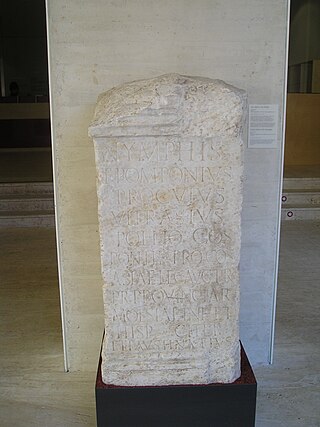The 160s decade ran from January 1, 160, to December 31, 169.

Annia Galeria Faustina the Younger was Roman empress from 161 to her death as the wife of emperor Marcus Aurelius, her maternal cousin. Faustina was the youngest child of emperor Antoninus Pius and empress Faustina the Elder. She was held in high esteem by soldiers and her husband as Augusta and Mater Castrorum and was given divine honours after her death.

Annia Aurelia Galeria Lucilla or Lucilla was the second daughter of Roman emperor Marcus Aurelius and Roman empress Faustina the Younger. She was the wife of her father's co-ruler and adoptive brother Lucius Verus and an elder sister to later emperor Commodus. Commodus ordered Lucilla's execution after a failed assassination and coup attempt when she was about 33 years old.

Annia Aurelia Faustina was an Anatolian Roman noblewoman. She was briefly married to the Roman emperor Elagabalus in 221 and thus a Roman empress. She was Elagabalus' third wife.
Marcus Annius Verus was the paternal grandfather and adoptive father of the Roman Emperor Marcus Aurelius, and father-in-law of emperor Antoninus Pius.

Annia Cornificia Faustina was the youngest child and only daughter of the praetor Marcus Annius Verus and Domitia Lucilla. The parents of Cornificia came from wealthy senatorial families who were of consular rank. Her brother was the future Roman emperor Marcus Aurelius, and both were born and raised in Rome.
Marcus Annius Libo was a Roman Senator active in the early second century AD.
Annia Galeria Aurelia Faustina was a daughter of Roman emperor Marcus Aurelius and his wife, Faustina the Younger. Her sister was empress Lucilla and her younger brother was Commodus. Her maternal grandparents were Antoninus Pius and Faustina the Elder, while her paternal grandparents were Domitia Lucilla and the praetor Marcus Annius Verus. She was born and raised in Rome.

Annia Cornificia Faustina Minor was a daughter of the Roman emperor Marcus Aurelius and his wife, Faustina the Younger. She was sister to Lucilla and Commodus. Her maternal grandparents were Antoninus Pius and Faustina the Elder, and her paternal grandparents were Domitia Lucilla and praetor Marcus Annius Verus. She was named in honor of her late paternal aunt Annia Cornificia Faustina.
Marcus Peducaeus Plautius Quintillus was a Roman noble closely related by birth, adoption, and marriage to the Nerva-Antonine emperors. Through his marriage to Fadilla, the daughter of Emperor Marcus Aurelius and Empress Faustina the Younger, he became the brother-in-law to the future emperor, Commodus. Despite his position, he never became emperor himself. After Commodus was assassinated in 192, he fell out of favor with Septimus Severus during the Year of the Five Emperors. In 205, he killed himself after Septimus issued an order for his execution.
Annia Fundania Faustina was a noble Roman woman who lived in the Roman Empire during the 2nd century AD. She was the paternal cousin of Roman Emperor Marcus Aurelius and his sister Annia Cornificia Faustina.

Titus Pomponius Proculus Vitrasius Pollio was a Roman senator, who held several imperial appointments during the reign of Marcus Aurelius. He was suffect consul in an undetermined nundinium around 151; he was a consul ordinarius in the year 176 with Marcus Flavius Aper as his colleague.
Gnaeus Claudius Severus Arabianus was a senator and philosopher who lived in the Roman Empire.
Marcus Ummidius Quadratus Annianus (138–182) was a Roman Senator and the nephew of the Emperor Marcus Aurelius. He was involved in an unsuccessful plot to assassinate his cousin the Emperor Commodus, which led to his execution afterwards.
Ummidia Cornificia Faustina was a wealthy Roman noblewoman, an heiress and the niece of the Roman Emperor Marcus Aurelius.
Tiberius Claudius Severus Proculus was a Roman Senator. Via his mother he was a grandson of Emperor Marcus Aurelius, but he played only a limited role in dynastic politics.
Annia Faustina was a noblewoman of Anatolian Roman descent and a wealthy heiress who lived in the Roman Empire. She was a mother-in-law of the emperor Elagabalus.
Pomponia Ummidia was an Anatolian Roman noblewoman and was a prominent figure in Rome during the reigns of the Roman Emperors Gallienus, Claudius Gothicus, Quintillus and Aurelian. She lived in the period the Crisis of the Third Century in the Roman Empire.
The gens Ummidia was a Roman family which flourished during the first and second centuries. The first member of the gens to achieve prominence was Gaius Ummidius Durmius Quadratus, governor of Syria during the reigns of Claudius and Nero. The Ummidii held several consulships in the second century, and through the marriage of Gaius Ummidius Quadratus Annianus Verus they were related to the emperor Marcus Aurelius.
Gaius Ummidius Quadratus Sertorius Severus was a Roman senator active during the second century AD. He was suffect consul in absentia for the nundinium of May to June 118 as the colleague of the emperor Hadrian. He is more frequently known by his shorter name, Gaius Ummidius Quadratus; his full name was known only after a missing piece to an inscription from Tomis was found.